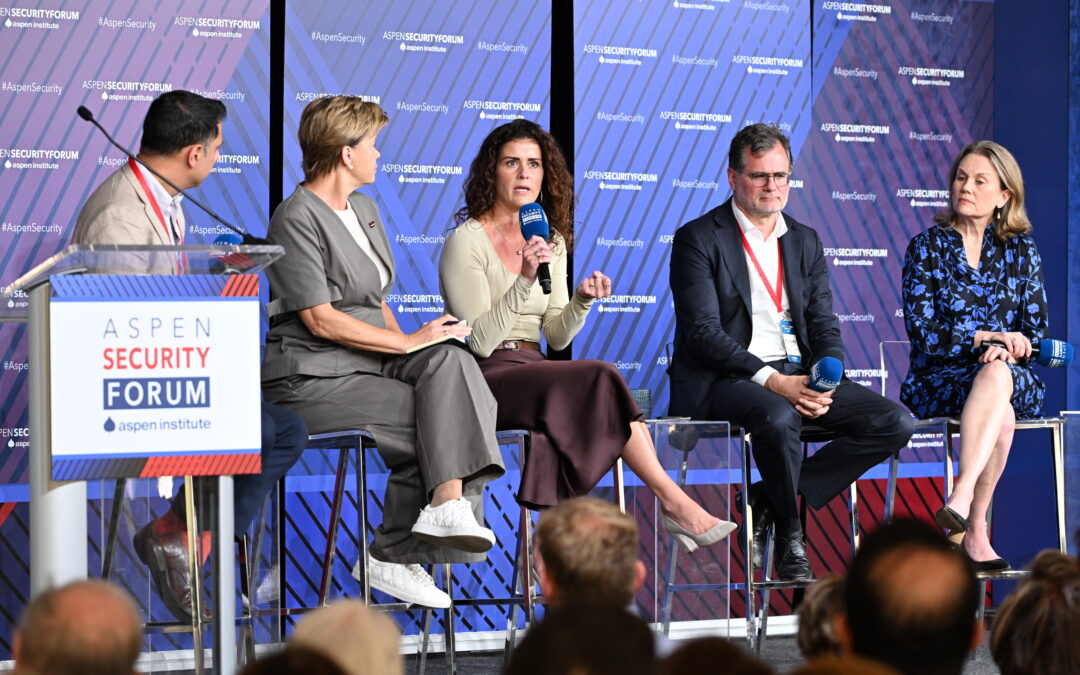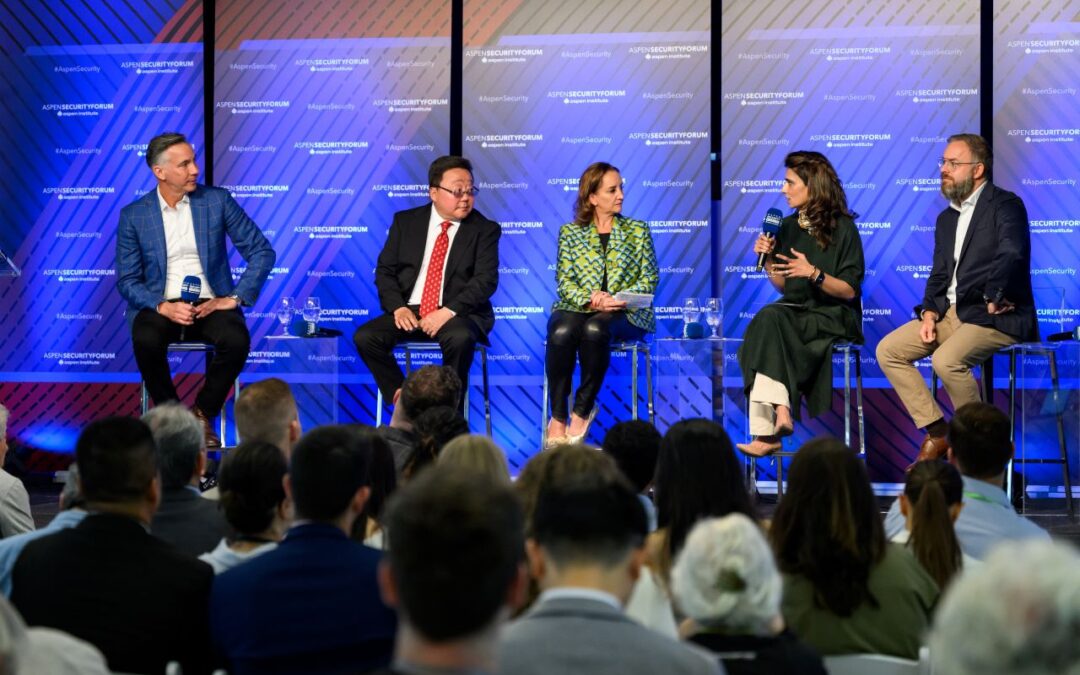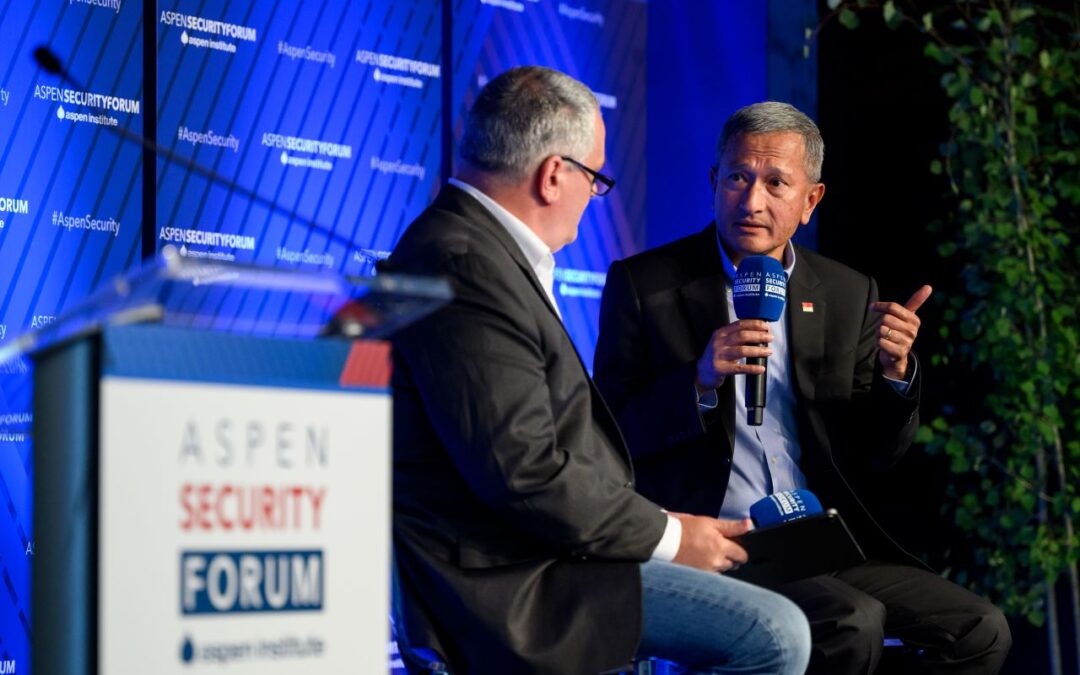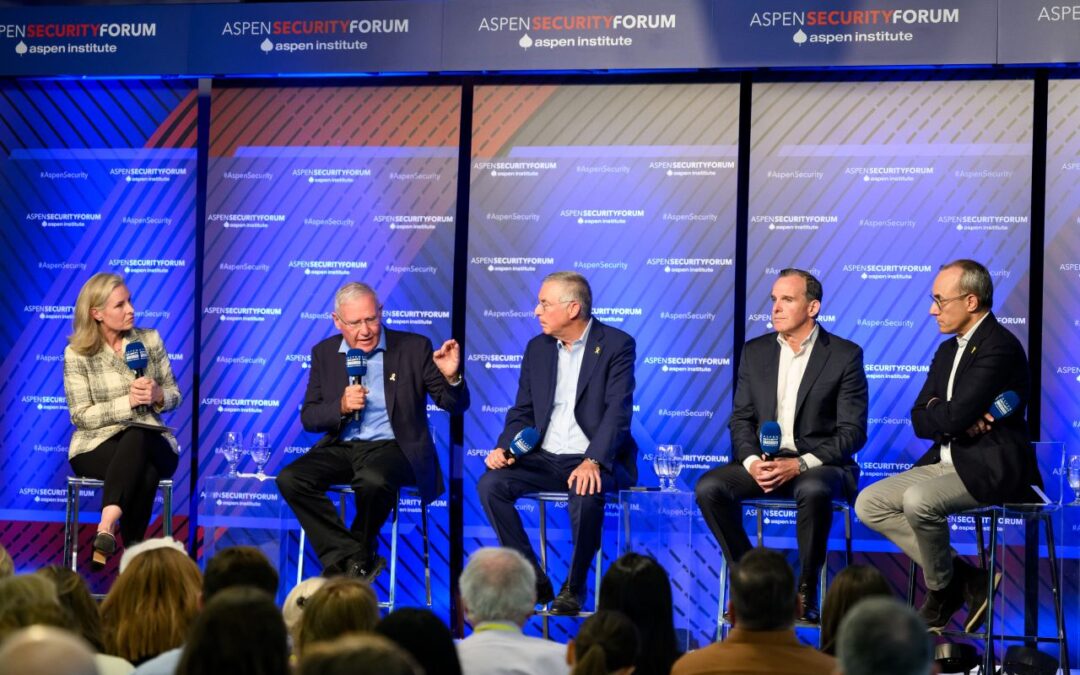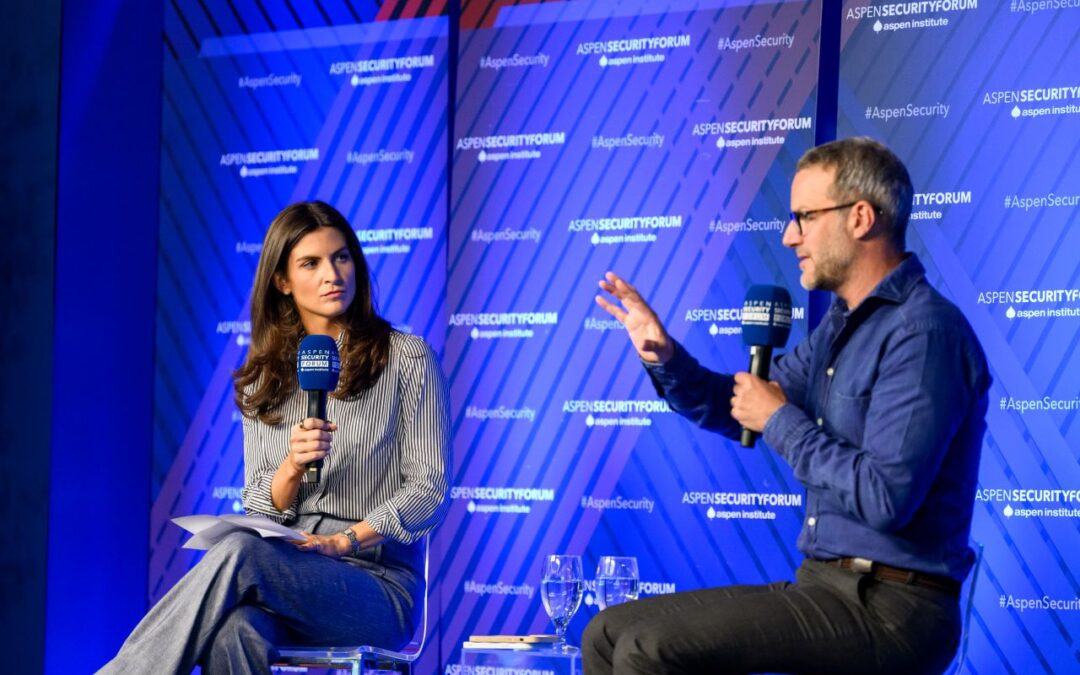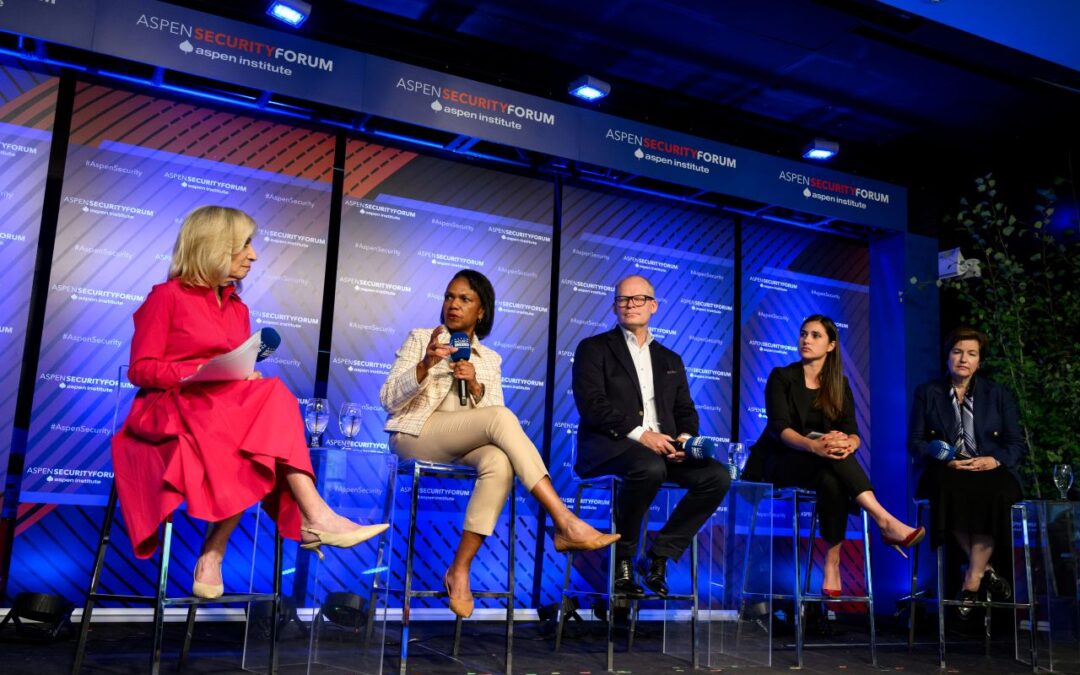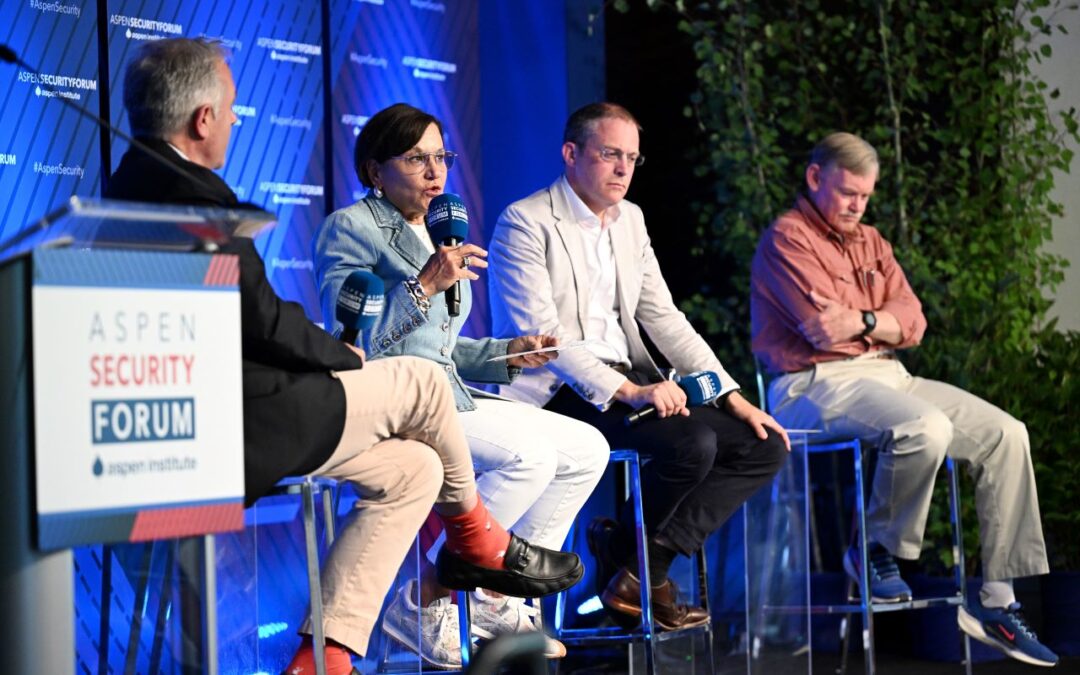Speakers
Condoleezza Rice, former U.S. Secretary of State
Moderator: Peter Baker, Chief White House Correspondent, The New York Times
Full Transcript
Read the full transcript below or download it to your device.
Click to read the full transcript
00:00: Secretary Rice, thank you for joining me today. Thank you for taking the time to do this. Congratulations to you on taking over the Hoover Institution. I hope congratulations is the right way to look at it. I can’t imagine how you’re going to squeeze in the figureskating and the golfing with all that, but if anybody can, I know it will be you, and thank you too and Nick, by the way, for helping with that book on James Baker, you were both very generous with your time and your recollections to help us make sure we got that right, and so I just wanted to throw that in there too.
00:36: So Secretary Rice, we’re going to start right off with some pretty big stuff. This is a really tumultuous time in our history, both here at home and around the world, big things are happening, and it feels like… We always say and maybe it’s a cliche, but it feels like a hinge point, and I want to get you talking a little about that. We all remember, of course, the cataclysmic event of 9/11 that happened when you and President Bush and how you and President Bush and the whole team responded to that challenge. In terms of American fatalities, we’re now experiencing a new 9/11 basically every twoandahalf days.
01:14: Other countries have had flareups lately, but it’s such a different scale. I looked at the numbers. On August 1st, France had 11 deaths, Australia had seven, Japan had one, Spain and Germany had zero, we had 1244. What are we doing wrong? What should we be doing? And what is this doing, more importantly, I guess, to American leadership? Where is this going to leave us in terms of our place in the world? Normally, we are a leader in moments like this as we were after 9/11. How do you see us right now?
01:44: Well, first of all, thank you very much, Peter, for taking the time to do this. I’m looking forward to our conversation, and I’m really looking forward to your book. James Baker was one of the, is one of the great figures in American diplomacy, and I very much look forward to that. Yes, this is really a challenging time. Now, some of us who are old enough will say that we’ve been through other challenging times. I was a child in 1968. I 1968, we had two political assassinations, we had riots in Watts, we had the Tet offensive, we had all kinds of trouble and crisis, and so I think it’s important to look back with perspective that we’ve survived other crises before, but why is this one different? It’s different because this unseen enemy, this unseen threat of the virus is so ubiquitous among the population, and it is very difficult for government to get control of the habits of 330 million people.
02:47: I mean, the fact is that what we’re asking here is that because we’re very individualistic people, because we are a society that is not that easy to govern, we’re actually asking individual Americans to make good decisions, and I think we sometimes forget that whatever organization of government we might have, it really does come down to the responsibility of individuals making good decisions, not just on behalf of themselves, but on behalf of others. I think one of the things that has made it perhaps more difficult and here, I do think we could have done better in terms of
national leadership, is that we have had, both from the health community and from our leadership, sometimes mixed messages about what that good behavior ought to look like.
03:38: And at a time like this, you don’t want mixed messages. But I will tell you as somebody who’s been in those circumstances under difficult times, I try not to be too hard on those who are trying to manage a circumstance like this, because this has been an unfolding story, we didn’t know much about this virus at the start. Many of the questions about how a pandemic would have behaved would have said children would have been among the most vulnerable. It turns out they’re among the least vulnerable, and so we’ve been learning on the job. So if you put those together, the fact that we’re still learning about the virus, the fact that we’re a very decentralized governing structure, governors have been in fact more important to this story than the federal government. If you look at the mixed messages and you look at the fact that all Americans have to make good decisions, this is really much tougher, I think, than anything we’ve ever had to manage.
04:34: What do you think this is going to do in terms of our longterm consequence? We were already seeing this great debate unfolding here and around the world, I think globalism and isolationism, internationalism versus America first, and now we’re seeing our country and others shutting down borders, trade is falling. Travel obviously is limited. We were talking beforehand that neither you nor I, I think, have traveled anywhere, certainly outside of this country in four months, which would not be normal. International summits have been cancelled, nationalism feels like it’s on the rise. So when this is over, or when this recedes on some level, which hopefully at some point it will, what are the longterm consequences, do you think?
05:19: Well, the longterm consequences I hope are still in our control. But let me talk about what it looks like in the shortterm. Peter, I don’t think I’ve ever seen the greater revenge of sovereignty, let me just call it that. When I think back to prior crises, I look at 9/11. After 9/11 we got greater international cooperation on law enforcement, on intelligence cooperation, the UN very early passed ways to track terrorist financing, we got the Proliferation Security Initiative to be able to track suspicious cargo across borders. Ninety countries participated in that ultimately.
05:57: After the financial crisis in 20082009, the G20 met in Washington in November and set some guard rails about what kinds of policies might make the recession shorter and less fundamental. And so they agreed that they wouldn’t have beggar thy neighbor trading policies. Now, did people break some of those rules? Of course, but there was a sense that the international system knew that you couldn’t control terrorism or you couldn’t control the financial crisis within your borders. This time around, it’s been my protective equipment, my travel bans, my citizens. In the early stages of this crisis it was, “Get my citizens home, I don’t really care what happens to yours, we’ll leave them on the cruise ship, just get my citizens home.” And so it’s been a very nationalist response.
06:52: Maybe that’s to be expected when you have something like this that people revert to wanting the governance that’s closest to them, but what is really striking is that the international institutions and, to a certain extent, international cooperation, have largely been sidelined. Now, there’s one exception to that, that is that the scientific community has continued to operate in a kind of borderless way, so that they’re sharing information, they’re sharing data, but for the most part, this has been a very nationalist response.
07:24: So the question that I would have is, how do we make sure over time, the policy question is, how do we make sure going forward that that’s not the permanent state of affairs? In other words, that we reinvigorate international cooperation and that we reinvigorate the international institutions. I think we have a big moment coming up with the G20 meetings in November when we will either prove that international institutions can have an important impact or we won’t. And if they don’t have an impact, then I think we’re in for a long period of just kind of national policy. So can the world come together around issues like what would travel standards look like around the world. When we walk into an airport, Peter, for an international flight, the procedures aren’t exactly the same, but they’re familiar. And they come out of the 9/11 period of trying to deal with terrorism. Is it possible to think about something like that, that will allow people to feel comfortable traveling again?
08:32: What do we do about the vaccine? If we’re so fortunate and blessed as to have a vaccine, we don’t want it to be the Hunger Games in terms of just every person, every country for themselves, we’d like to think that a pandemicsaving vaccine could be distributed on the basis of need across borders. What are we going to do about trying to reboot economic growth? Is there a way to do that collectively? This is going to be, I think, a big test for the international system and for its institutions, but I think we need to focus right now on what kind of response can demonstrate that those institutions can have a say in how we move forward.
09:21: Let’s talk about one specific institution, what about the World Health Organization. President Trump is withdrawing us from that saying, “Well, they’re a captive of the Chinese.” It does feel like there are questions that the Chinese ought to be asked about how they handled this, but is that the right response, should we be leaving the World Health Organization?
09:37: Well, we’ve still got a little time. As I understand it, there’s a notification period and then a period where we’re going to continue to pay dues, so maybe there’s still time. I have to tell you, I think the World Health Organization desperately needs reform. I was National Security Advisor during SARS. I don’t think it actually reacted very effectively, I think it wasn’t very effective during ebola, that really was more a response of countries getting together to do something. So it needs reform, but I personally am one who believes in reforming institutions and it can’t really reform, I don’t believe, unless the United States is involved in that reform.
10:17: I do think that there is a reckoning for China in the way that it dealt with the early stages of the pandemic. We also had problems during SARS in the same way, that we knew something was going on, but we didn’t know what, we couldn’t get answers. And so one real task for the international system going forward is the next time, and there will be a next time, how can we have better early warning when something breaks out? How can we share data better earlier so that nations can get ahead of the curve?
10:52: Because this time we now know that the Chinese knew, really even before they shut down international travel, which is kind of a problem. I do think they have a reckoning. But one way to deal with that would be to go to the Chinese privately, quietly and say, “Okay, we know what you did, it was wrong. Let’s try to fix it next time.”
11:21: You talk about mixed messages. I think back to President Bush who read John Barry’s great book about the 1918 pandemic, and he ordered the administration to start thinking real seriously and prepare for a crisis like that. And our current President, though, has as you said, mixed messages is one way of putting it. He said that this would disappear on its own, the cases would go down to zero, that it was just like the regular flu, the country should reopen, the protesters should fight to liberate states, he wouldn’t wear a mask until recently, even now, really not. I mean, does is matter? It seems to me that presidential leadership matters, and I wonder how you assess that, how should we assess his leadership through this?
12:03: Well, this is very hard. As I said, part of the reason for the mixed messages is the story kept changing, even from health officials. I do remember when masks weren’t supposed to help. So once you tell people masks actually don’t help, don’t do it. I know they were trying to keep the focus on protective equipment for front line workers, I fully understand that. But all we heard as Americans was, “Masks don’t help.” And then all of a sudden mask, everybody has to wear a mask. And so let’s not just say that the mixed messages were coming out of 1600 Pennsylvania, they were coming in a lot of ways. I believe personally, that presidents can speak too much.
12:50: One of the suggestions that I would have made early on in this crisis was that the President speaks infrequently, he has something important to say when he speaks, and he leaves the daily briefings to Dr. Birx and Dr. Fauci and maybe the HHS Secretary and so forth. Because we learned the hard way, Peter, you don’t want to make the President of the United States the fact witness. We learned that in Iraq, frankly, you don’t want the president to be the one who’s talking about the raw data, it’s really not a good role. And so this president is singular, he likes to tweet, he likes to talk every morning, I understand that. But, in a crisis like this, message discipline is so key. And frankly, presidents, when they’re asked something, they’ll answer it, even if they’re not quite certain what the answer should be.
13:51: And that’s not just President Trump, that’s presidents. So I think one of the problems in the way that this was structured was just too often and commenting on everything. When we had… You might remember the mad cow disease breakout over a Christmas… I’ll never forget, it was Christmas week. And poor Ann Veneman, who at the time was the Agriculture Secretary, was sent out there two, three times a day to talk about mad cow. But the president said very little about mad cow. So you want the president to be a reassuring figure, absolutely. But I don’t think you want to make him the fact witness.
14:34: Can we talk about internationalism in our leadership. What message are we sending right now to our allies with this drawdown of the troops from Germany? You’ve spent a lot of time thinking about Germany, you’ve written books about the German reunification, what message are we sending to Angela Merkel, what message are we sending to our allies around the world?
14:52: I do believe that there is some truth in the idea that our military force posture still reflects the Cold War. I remember when I became Secretary, Peter, we had more foreign service officers in Germany, with 80 million people, than we had in India with a billion people. Now, why was that?
That reflected the fact that Germany was the epicenter of the Cold War. Now, it is entirely possible, I’m not inside the analysis, but it’s entirely possible that it’s time to think about a reduction of troops in Germany, but I do think that you do that first in quiet conversations with the Germans and with NATO about what that might look like.
15:42: You decide, and there’s now some talk that they’re actually not coming back to United States, they might go to Poland or to the Baltic States, that seems to me a reasonable thing to do, given Russian behavior toward… Particularly toward the Baltic States and what’s going on in the build up at Kaliningrad and so forth. So this may turn out to be the right thing to do, but again, in terms of the process, it’s helpful to do it in a way that your allies feel not just consulted, but a part of the decision. Probably relatively unknown, we did a major restructuring of our troop presence in South Korea in the Bush administration.
16:22: When Don Rumsfeld came to office as Secretary, he said we needed to rebalance, he was absolutely right. We had troops very close to Seoul, that was a problem for our relations with the population. We were sitting on some of the most valuable land in South Korea. And so, we found when we raised this question, the South Koreans were actually… Very much wanted us to restructure our presence there. So, very often you can find common ground, it just takes some time to do it. And this is where I do think some of the turbulence and turnover in administration officials is problematic, you just… There have been a lot of people in the various key roles, and I think sometimes you get things lost between them.
17:17: I want to let everybody watching know we’re going to be taking questions from the audience soon, there’s a raised hand function, don’t do it yet, wait till we get started but we’ll… This is new for me, we’ll figure it out, I think it’ll be fun. One or two more international questions then I want to ask about things at home. We have intelligence reports that the Russians may have been paying bounties or offering bounties to Talibanlinked extremists to kill American soldiers in Afghanistan, and we know that from our reporting that there is not a complete agreement among the intelligence agencies, they have different levels of confidence.
17:54: You’re very experienced with intelligence that isn’t necessarily a 100% that probably… Very little intelligence is a 100%. Should this be brought to a president even if there’s not a 100% conclusion on this, and if so, what should a president do about it, even if it might not be known to… He’s talking… President Trump has talked with President Putin now eight or nine times since this intelligence came to the fore, and apparently never addressed it even once, what would… How do you look at that?
18:21: Well, whether the President should raise it with a foreign leader depends of course on how much confidence there is in the intelligence and… Here I think there’s been a little unfairness to the president. Look, before you go tell the Russian president, “We think you’re trying to kill our soldiers,” you probably want to have some confidence in the intelligence. And, maybe this could have been raised at the level of Defense Secretary or Secretary of State or whatever with the Russians, but I think you want to be very careful about raising something that then later on turns out not to be true. And, from your reporting, Peter, I have to say that this intelligence didn’t seem terribly rock solid to me, just from reading between the lines.
19:06: I remember during the Iraq intelligence issues, people were saying, “Well, you know, you had one agency that said that those weren’t for that, you should have gone with that one agency.” Well here you have several agencies saying, “Well, we don’t know about this.” So I do think you can… You need to be very careful in what you raise with foreign leaders about intelligence. If I had done this, I would probably not have done it, I don’t know what the intelligence really looked like, but I probably would not have done it at the level of the President and President Putin, I probably would have done it at a lower level. And depending on how good the intelligence was, how low the level. Because again, you don’t want to be embarrassed if our intelligence agencies then say, “Oh, yeah, never mind.”
19:53: Right. You mentioned the Iraq thing. So I want to mention that Robert Draper has a new book out on the decision to go to war in Iraq. And he looks at it in a very granular way, it’s a very interesting book. And he writes that we often think of the failure of intelligence there as a failure of imagination, to imagine that in fact Saddam Hussein didn’t have weapons. It seemed inconceivable to many people, Republicans and Democrats, that he didn’t have weapons. But he writes… He thinks it’s the other way around, actually, that it was the option, that imagination rather than facts had driven policy, that we had concluded something and therefore tried to look for the things that proved what we had already assumed were true. What lessons do you take from that? You kind of adressed that a minute ago, but what lessons should we take from that?
20:40: Context matters, right? If we had learned, for instance, that the Japanese were buying large amounts of chlorine we would have said, “Oh, they have a lot of swimming pools.” But when Saddam Hussein buys a large amount of chlorine, an active agent in nerve gas, and he does it through military front companies, that piece of data looks very different. So yes, the context mattered. Yes, the fact that he had had weapons of mass destruction. Yes, the fact that he tried to hide everything from inspectors and, in fact, eventually the Clinton administration had to have the inspectors removed because they weren’t getting anywhere. So yes, all of that mattered to how you read pieces of data. Because Peter, as you’ve just said, in regard to the Russian bounty issue, you never have something that says, “Here, we have 100% confidence that this is for that.” So you’re painting a picture.
21:46: And frankly, after having been told we didn’t connect the dots with 9/11, and I can tell you those dots were pretty scattered too, to not then connect the dots on a serial, a person who serially sought weapons of mass destruction in Saddam Hussein, who actually had gotten them, who’d actually by the way, used them in war, yes, and unfortunately, from our point of view, the intelligence was not… Didn’t add up to what we thought it added up to. But did we have some preconceived notion about Saddam Hussein in weapons of mass destruction? Of course. Anybody who had dealt with Saddam Hussein for the 10 years since the end of the Gulf War would have had preconception notions about Saddam Hussein and weapons of mass destruction.
22:42: Let’s talk about in our own country right now, obviously it’s a very polarized time, a time of struggle over issues of race and justice. President Trump and Attorney General Barr have said they don’t think there’s… I know you wrote, by the way, you wrote a really, a moving book about growing up in Birmingham and the bombing of the church there when you were a young girl. And I
recommend that anybody who wants to read about our own history with civil rights and Jim Crow, they should read about your experiences. You wrote an oped in the Washington Post the other day or a few weeks ago about this as well. President Trump and Attorney General Barr said they don’t think there’s systemic racism. In effect, they’re saying, this is a bad apple situation. Is there systemic racism? Is this something we should conclude that there is a systemic racism problem?
23:33: Well, I would like to have a better definition of systemic racism so that we can actually address it. We have a tendency to throw terms around and then we don’t really know what they mean. So if by that we mean that there is something in the system that is part of the explanation for the persistent, the stubborn achievement gap between black students and white students, even when you control for economic conditions, some thing’s in the system that’s causing that. Because I don’t actually believe that black kids are inherently less intelligent somehow. So something in the system is causing that. We know that in certain neighborhoods, policing looks different than it looks in other neighborhoods. And because of economic circumstances, those neighborhoods tend to be more minority than not. Is that something in the system? Yes, that’s something in the system.
24:40: But I think we have to break it down because, Peter, I’m someone who believes very much that we had a birth defect at founding, slavery was a birth defect. And it still has an impact. When I hear people say, “Oh, I want us to be colorblind.” No, I actually don’t think we’re ever going to be, I don’t really care if we’re color blind. But I would like to get to the place that when you see somebody who is black, you don’t have preconceived notions of what they’re capable of, who they are, by the way, what they think, which is, I think a problem of the left, you look at somebody who’s black and you think you know what they think or you at least think you know what they ought to think.
25:20: So I think that, yes, these are issues that continue to bedevil us from a long history with racism. And they do get built in to systems in ways that have negative impacts. But I am not one who believes you can just sort of, quote, take on systemic racism, I don’t even know how to start. I do think you can take on the impact of an educational system for minority kids that leaves most of them behind, I think you can take that on. But people might not like my answer. My answer is, let’s do school choice in a big way. Why?
26:07: Part of the systemic issue here is that we have an optout K12 education system. So if you are of means, you will move to a district where the schools are good, the houses will be expensive and the schools will be good. Palo Alto, Fairfax County, you name it. You know where it is in your town. If you’re really wealthy, you’ll send your kids to private schools. So who’s stuck in failing neighborhood schools? Poor kids, and they’re mostly minority kids. So I would say to people, if you want to address this, tell me that having charter schools, having vouchers for people, for poor parents to be able to move their kids, having interdistrict mobility within states. Okay, tell me that that’s bad ’cause it’s not good for the public school system. But then if you’re going to write that editorial, send your kid to school in Anacostia. Don’t send your kid to Sidwell Friends, and then write that editorial. So my answer on this part of quote, systemic racism doesn’t actually accord with the agenda that many people who claim to want to undo systemic racism have laid out.
27:27: You said in your piece that you… Or I think maybe it was on CBS, you said you wanted President Trump to speak in the language of unity and the language of empathy. And I think about John Lewis’s funeral just the other day, moved so many Americans, people around the world, President Bush was there. And he said he believed in an America where he could disagree with John Lewis and still admire him and respect him and speak at his funeral. And President Trump was asked about John Lewis’s legacy, yesterday, he says, “I don’t know John Lewis. He chose not to come to my inauguration.” Is it really conceivable that President Trump can speak in the language of unity, or have we learned that that’s not possible in the last four years?
28:07: Well, look, I have heard him speak in unity, I would like to hear it more, frankly. And I actually thought the John Lewis situation was an opportunity. We all have disagreements that we try to put aside at certain points in time. I believe, I may be wrong about this, but John Lewis may not have gone to George W. Bush’s first inaugural either.
28:33: That’s exactly right. He didn’t, and that didn’t stop George W. Bush from coming to his funeral and paying tribute to him.
28:38: Right. Because sometimes you need to be able to overcome. But again, I think that part of the issue here, and look, the next president’s going to deal with this too. Presidents are communicating in ways now that I would never have imagined when I was National Security Advisor. Just, you didn’t get up in the morning and say, “Oh, what did the President say overnight?” Because there was no overnight way to do it. And so I have really hoped that the President would step back. Nobody… None of us should say the first thing that comes to mind. None of us. And that’s what Twitter has a tendency to make us want to do, with all due respect to my friend Jack Dorsey, who I know well and like a lot, that’s what it tends to make us do.
29:31: And so yeah, I would still like to hear more unifying messages. I’ll just take one on flat out. I actually don’t know why anybody wants to defend the Confederacy and Confederate monuments. I also don’t know why anybody wants to tear down a statue of Abraham Lincoln and slaves, which was actually funded by freed slaves. So this has gotten a little out of control, frankly, and I don’t want to be the Soviet Union where we’re trying to erase history. But the glorification of the Confederacy, which by the way, came after Reconstruction really, and as a response to the fact that really Abraham Lincoln didn’t make the Confederacy pay because he wanted to reunite the country quickly. This glorification of people with military bases named after military officers who tried to destroy the country, I don’t get it.
30:38: Yeah. I’m going to let, open it up for questions now. One last question, though, you said, ’cause people will kill me if I don’t ask this, in October 2016, you said President Trump didn’t have the dignity and stature to be President. Your former colleague, Jon Bolton, has recently said, who worked for President Trump, said he’s not fit for office. Are you open to voting for President Trump, or is that something you can tell us you’re not going to do?
31:00: First of all, elections decides who’s fit. Let’s just remember that. Look, Peter, when I want to make a statement about American… About my views of American politics and what I might do, you’ll be the first I’ll call, how’s that?
31:14: I think you told Margaret Brennan that. [laughter]
31:16: Well, I guess I’d better call both of you then.
31:18: Well if we’re doing it alphabetically, Baker comes before Brennan so just…
31:21: This is true. This is true.
31:22: Just remember that. Okay, we’re going to… I assumed that was going to be the answer, but I’m going to open this up for questions, please. Questions can be asked by using the raised hand function located near the center of the meeting control bar, that’s what I’m told, I hope this is correct. And then if somebody can tell me how I pick them. Do I pick them? Okay, so how do I… Okay. Sorry about this, I’m looking to see for hands that are raised, I don’t see where I see that.
32:10: Peter, why don’t you just… We’ll look for the questions. I’m not sure people have asked them yet. Why don’t you continue with your interview with Condi and we’ll get you the questions.
32:17: Okay. Alright. We’ll go a little longer while we get these questions cued up. Secretary Rice, one question I actually was curious about, have you ever actually been contacted by President Trump looking for advice?
32:29: I have talked to the President on a couple of occasions early on when he was elected or after he’d been elected, I think it was March of ’17. I’m actually much more in touch with the Vice President who I’ve known for quite a long time and speak to him. And then I did… I was on a call with the President, he was trying to think about how to reopen the economy, but I don’t know that I really had much to help with on that. But I feel that I have connections to the administration, particularly I’ve talked to, talk relatively frequently to Secretary Pompeo, and so if I have, I’m one who believes you can overvalue your advice once you’re out, because I was in once, and so I know that people who are out can overvalue their advice. And so I try to be abstemious about when I give it.
33:30: Alright, I think we have our questions. I think I see questions. People asking questions here, I’m going to ask for Ambassador Sanders. How do I… Do I click on that? Alright, I think that’s…
Thank you. He will appear momentarily we have a slight lag, I think, in the callin.
34:00: Yes, can you hear me?
34:01: Yes.
34:02: Yes.
34:03: Hi, Secretary Rice, good to see you again.
34:05: Yes.
34:07: I wanted to ask you in the south south, which countries do you think today we can work the most with or the best with and why?
34:16: I’m sorry, in the south? In the?
34:18: South south countries.
34:20: Yes. Yes. Look, I think that we have to be able to deal with all countries that are trying to do the right thing in terms of governance, in terms of providing for their people, it’s why I like very much the way that we went about the Millennium Challenge Corporation, which incented countries to come to us with ideas for improving governance, improving their economies. Middle income countries were not eligible, but I think we were able actually to even help in getting better laws. I’ll give you one interesting example. Lesotho wanted an MCC compact, and they had some ideas about business development. But they had in their constitution or they had in their laws, a law that women couldn’t own property and businesses in their own name, And so we said to them, “Well, that either goes or you’re out of this compact competition.”
35:30: And so I think we can work with almost any country that’s willing to make that commitment. Obviously, I think the countries of our own hemisphere are extremely important now and I worry about some of the backsliding of, in some of the countries of Latin America, and I hope we have a more active role there. And then of course, as I said, in Africa, we have a long history that’s really I think the Bush administration did a lot of work there. So I think there are a number of countries with which we can work, but I would make the criterion not a named country, but are you really trying to provide for your people, to govern democratically and governed without corruption.
36:16: Okay, Madam Secretary, we have a question from Iya Mermershvireely if I pronounced that correctly. I hope I have. Iya, you should be on in a second, I think… I think that …
36:35: Hello.
36:36: Yes.
36:39: Hello, Madam Secretary, it’s so good to see you and so good to hear you. I hope you can hear me.
36:44: I can.
36:45: Yes, so nice to see you. This Saturday August 8th marks the 12th anniversary of Russian invasion of Georgia. And you played a very critical, instrumental role in stopping Russia’s advancement towards Tbilisi. Now, since then, we saw many other, both military and other types of operations by Russia, including illegal taking over of Crimea, Skripal poisoning, even US elections, war in eastern Ukraine, you name it. So all of this, it seems like, had origins in Georgia in 2008.
And now we know that President Putin may stay in power until at least 2036. So what’s your advice
or advice to Georgia how to deal with Russia and how we as the Western developed world should deal with President Putin?
37:49: Thank you. Well, on Georgia, first let me just say that, as I said to the Georgians at the time, and I’ve said it to Ukrainians and others, the international circumstances may not be very propitious, but you have to build your own country, you have to build your own democracy, you have to build your own economy, you have to have the right rules and laws for economic development, and the international system can help. But it starts with good governance at home. And Georgian democracy has had its ups and downs, but it’s survived. And I think that’s a good sign.
38:22: When it comes to the Russians, I would… I have two parallel notions here. The first is where Putin needs to be deterred, you have to deter him. It’s one of the reasons that I think if we’re going to move forces out of Germany, moving them into further east is a good idea, because the truth of the matter is we’ve never actually just been dependent on what the president says to deter even the Soviet Union. It was the American soldiers who were actually in harm’s way in Germany that deterred the Soviet Union. And so I believe we can do more in NATO to deter. I think we can do more to help the countries that are in Russia’s path, if you will.
39:06: And so arming the Ukrainians I think was a very important step. Deeper cooperation with the Eastern… The new entrants into NATO, they’re not so new anymore, the Poles the Czechs and others. I think that’s another way to send strong signals to the Russians. We have sanctions on the Russians, and I’ve largely agreed with those sanctions. But I want to say something about the other parallel path, and eventually there’s going to be a different Russia. A lot has happened in the almost 30 years since the collapse of the Soviet Union. During that period when I was a student in the Soviet Union, Russians didn’t… Soviets didn’t… Soviet citizens didn’t travel, they didn’t know the outside world. Now Russians travel, the Russian middle class spoils their kids at McDonalds and has their mortgage on their… Their 30year mortgage on an apartment. They want different things. And it’s not clear to me that Vladimir Putin is going to make it all the way. I don’t know if you’ve been following the big protest out in Khabarovsk and out in the far east. There’s a lot of anger at Putinism.
40:19: And so we need to play to the long game here. And part of my concern is in some of the sanctions we’re starting to sweep up people who we ought to be cooperating with for the future. I have a former student who’s a very major player in Skolkovo, which is Russia’s effort to build a knowledgebased economy. It’s hard for those people to get to the United States because of the web of sanctions. We want those people to come to the United States. So we need more nuance toward the Russian people, encouraging those who want a different kind of Russia. And maybe we have to wait out Vladimir Putin, but I wouldn’t take as a given that he’s going to stay as long as he might want to. Those regimes tend to be more brittle than you know or that we know.
41:09: We have a question, we’re running out of time here, we have a couple of minutes left, we have a question coming up from Yong Jung Cho, and while we put her in cue, real quickly I just want to clarify on your previous question on the Confederacy. Would you urge, I assume, the President to sign the NDAA, which requires changing the names of the bases?
41:24: Absolutely, absolutely.
41:27: Alright.
41:27: First of all, because we need an NDAA, that’s the first point to be made. And secondly, I can think of better names than Confederate generals for our bases.
41:38: Right. Alright. Is Yong Jung Cho up?
41:41: Yes, thank you. Madam Secretary, even after two summits between President Trump and North Korean leader, Kim Jongun, North Korea continues its nuclear development, its nuclear top missile can reach America. Where should United States go from here? What do you think is the best approach, multilateralism, sixparty talks, top down or bottom up?
42:04: I actually think the administration has done about as well as you can on North Korea. I mean, I certainly tried. Everybody’s tried with the North Koreans. I think that the first overture to Kim Jongun turns out, I think, to have been a good one from the President. I now believe that we’re seeing that this is going to be a long haul. There’s not going to be denuclearization in the way that we had hoped or that I had hoped. And so that’s where I think we probably need to start to formulate a more multilateral response. The United States can still be at the center of it, I have no objection to our being at the center of it, but you really do need a coordinated policy between first and foremost South Korea, which has the most at stake; Japan, which has issues with the North Koreans; China, which has some leverage in North Korea, although sometimes I think not as much as we attribute to it. And even the Russians who, even though we don’t agree about much, I don’t think the Russians want to see a nucleararmed North Korea either.
43:14: And so I think the multilateral approach actually brings those countries together. It’s why we had the sixparty talks, because you want to keep them aligned so that North Korea can’t pick off one at a time and play one side against the other. And that’s why I’ve generally wanted to have a more multilateral approach, even if you use the United States at the center of it, with which I don’t quarrel with the administration about that.
43:40: Okay, I think we’re basically running out of time here. I want to thank you very much for… Secretary Rice, for taking so much time with us today. It’s a great way to kick off this Aspen Institute forum. I think there’s going to be a lot of great panels and discussions all day. Myself, I’m looking forward to any number of them. I’m especially looking forward to Nick’s explication of hope. A little hope wouldn’t be a bad thing right now. Secretary Rice, you want to say anything just to end it before we throw it back to Nick?
44:09: May I just say one word, Peter, about where we are as a country. And I’ve heard a lot of people say, you know, the United States looks so broken now, that we’ve lost respect in the world. I understand that argument. But when it comes right down to it around, for instance, the racial issues, I’m actually grateful for the fact that we are able as a country to address these issues in an open way, that people are able to speak their minds and that people want to solve the issue. When I was a little
girl growing up in Birmingham, Alabama, a Black man being killed by a policeman wouldn’t have even made a footnote in the newspaper. And now you have people who want to do something about that. So one piece of hope for me is America is always reinventing itself, and we’ve got a lot to live down in the past. But I think we’ve got a tremendous future. And I will tell you, as a university professor, this is the most publicminded generation of students I’ve ever taught. And I just want to say to any of the young people who are here, keep trying, the democracy you get is a democracy that you own and work for, and so that’s my hope.
45:20: That’s a great way to end. And thank you very, very much for taking the time. It was great to talk to you, great to see you. Good luck with all your many other Zoom calls, which I know are many. And good luck to you in the future, as you take over the Hoover Institution, I think in just a few days, right?
45:38: Well, thanks, Peter, and come out and do a book event with us when we can see humans again.
45:42: I would love to do that.



